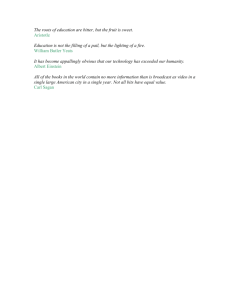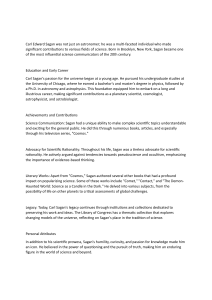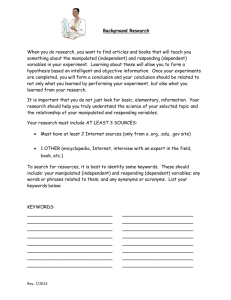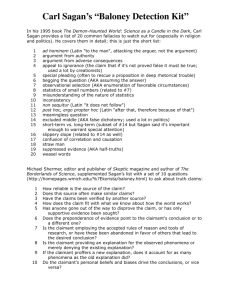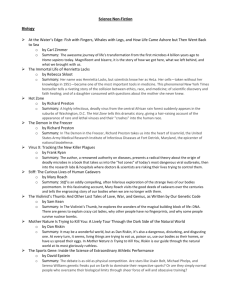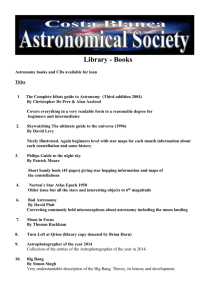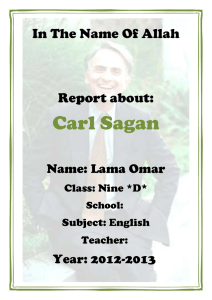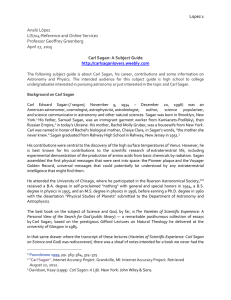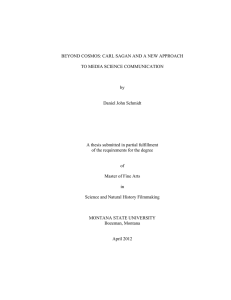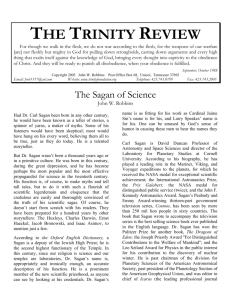Book Club Discussion Notes
advertisement
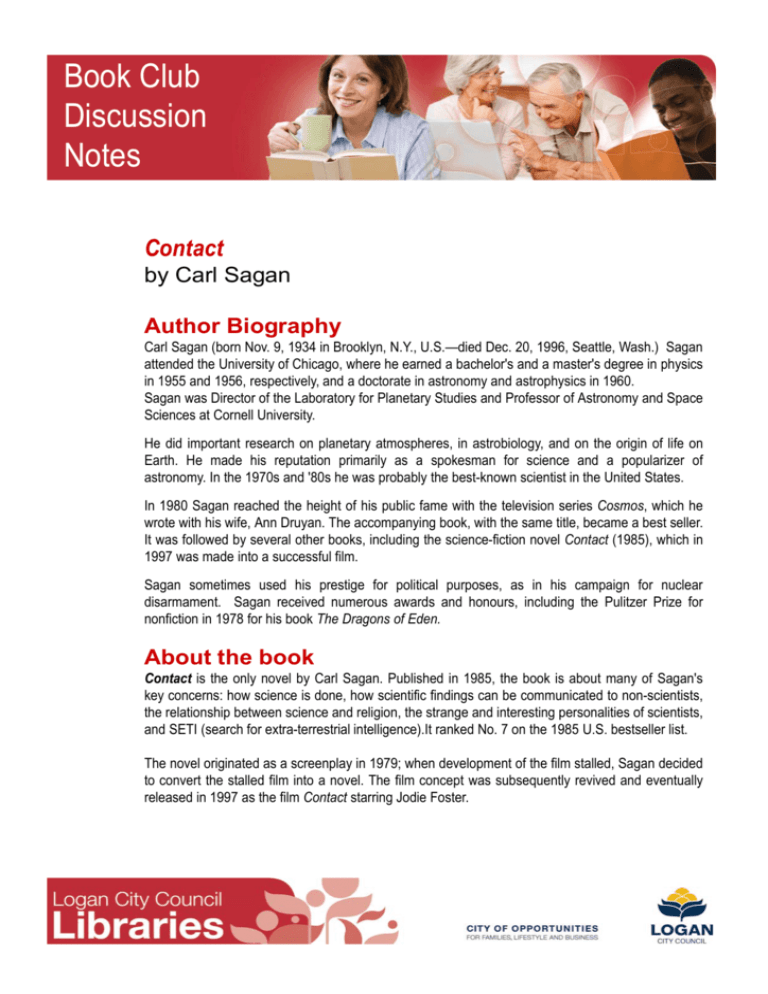
Book Club Discussion Notes Contact by Carl Sagan Author Biography Carl Sagan (born Nov. 9, 1934 in Brooklyn, N.Y., U.S.—died Dec. 20, 1996, Seattle, Wash.) Sagan attended the University of Chicago, where he earned a bachelor's and a master's degree in physics in 1955 and 1956, respectively, and a doctorate in astronomy and astrophysics in 1960. Sagan was Director of the Laboratory for Planetary Studies and Professor of Astronomy and Space Sciences at Cornell University. He did important research on planetary atmospheres, in astrobiology, and on the origin of life on Earth. He made his reputation primarily as a spokesman for science and a popularizer of astronomy. In the 1970s and '80s he was probably the best-known scientist in the United States. In 1980 Sagan reached the height of his public fame with the television series Cosmos, which he wrote with his wife, Ann Druyan. The accompanying book, with the same title, became a best seller. It was followed by several other books, including the science-fiction novel Contact (1985), which in 1997 was made into a successful film. Sagan sometimes used his prestige for political purposes, as in his campaign for nuclear disarmament. Sagan received numerous awards and honours, including the Pulitzer Prize for nonfiction in 1978 for his book The Dragons of Eden. About the book Contact is the only novel by Carl Sagan. Published in 1985, the book is about many of Sagan's key concerns: how science is done, how scientific findings can be communicated to non-scientists, the relationship between science and religion, the strange and interesting personalities of scientists, and SETI (search for extra-terrestrial intelligence).It ranked No. 7 on the 1985 U.S. bestseller list. The novel originated as a screenplay in 1979; when development of the film stalled, Sagan decided to convert the stalled film into a novel. The film concept was subsequently revived and eventually released in 1997 as the film Contact starring Jodie Foster. 5852074 - Book discussion notes template Book Club Discussion Notes Other titles: Non-Fiction • Intelligent Life in the Universe (1966)/ with L S Shklovskii • Planets (1966)/ with Jonathan Norton Leonard • The Cosmic Connection (1973) • An Extraterrestrial Perspective (1973) • Communicaton with Extraterrestrial Intelligence (1973) • Other Worlds (1975) • The Dragons of Eden : Speculations on the Evolution of Human Intelligence (1977) • Broca's Brain: The Romance of Science (1979) • Cosmos :The Story of Cosmic Evolution, Science and Civilization (1980)/with Gentry Lee • Murmurs of Earth : The Voyager Interstellar Record (1983) • Comet/ with Ann Druyan (1985) • Shadows of Forgotten Ancestors/ with Ann Druyan (1992) • Pale Blue Dot:: A Vision of the Human Future in Space (1994) • The Demon Haunted World : Science as a Candle in the Dark (1995) • Billions and Billions : Thoughts on Life and Death at the Brink of the Millennium (1997) • The Varieties of Scientific Experience : A Personal View of the Search for God (2006) Websites: http://www.fantasticfiction.co.uk/s/carl-sagan/ http://www.biography.com/articles/Carl-Sagan-9469191 Points for discussion : 1. How did you experience the book? Were you engaged immediately, or did it take you a while to get into it"? How did you feel reading it—amused, sad, disturbed, confused, bored...? 2. Describe the main characters—their personality traits, motivations, inner qualities. Are their actions justified? Do you admire or disapprove of them? Do they remind you of people you know? 3. Do the main characters change by the end of the book? Do they grow, or come to learn something about themselves and how the world works? 5852074 - Book discussion notes template Book Club Discussion Notes 4. Is the plot engaging—does the story interest you? Is this a plot-driven book: a fastpaced page-turner? Or does the story unfold slowly with a focus on character development? Were you surprised by the plot's complications? Or did you find it predictable, even formulaic? 5. Talk about the book's structure. Is it a continuous story...or interlocking short stories? Does the time-line more forward chronologically...or back and forth between past and present? Does the author use a single viewpoint or shifting viewpoints? Why might the author have chosen to tell the story the way he or she did—and what difference does it make in the way you read or understand it? 6. What main ideas—themes—does the author explore? Don't forget to talk about the title, often a clue to a novel's theme. 7. What passages strike you as insightful, even profound? Perhaps a bit of dialog that's funny or poignant...or encapsulates a character? Maybe comments that state the book's thematic concerns? 8. Is the ending satisfying? If so, why? If not, why not...and how would you change it? 9. If you could ask the author a question, what would you ask? Have you read other books by the same author? If so how does this book compare? If not, does this book inspire you to read others? 10. Has this novel changed you—broadened your perspective? Have you learned something new or been exposed to different ideas about people or a certain part of the world? (Questions by LitLovers) 5852074 - Book discussion notes template
